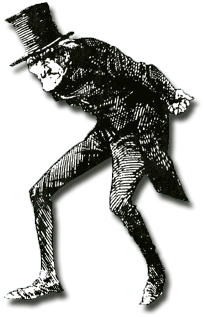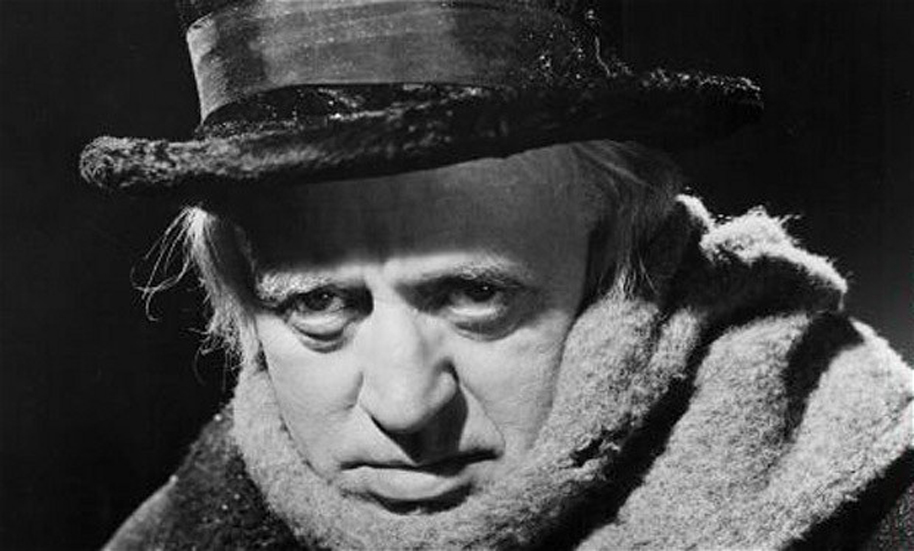I originally wrote this essay as a newspaper column in 1995. It appears here today with a few minor but festive updates because, well, Scrooge is timeless.
No businessman in the history of literature has been as misunderstood as Ebenezer Scrooge.
His very name is now a synonym for pinch-fisted churlishness and humbuggery. Why?
Certainly because that was Charles Dickens’s aim when, in his classic 1843 “A Christmas Carol,” he caricatured every vulgar tendency of the merchant class in bleak, 19th century London. Admittedly, it was not the best of times for the poor working man.
 And it’s nearly impossible to defend some of Scrooge’s more malignant personal qualities: He was a bitter, greedy, corpse-cold sociopath. Even by Industrial Revolution standards, he was a terrible boss, a menacing manager sorely out of touch with the generous foundations he learned as an apprentice to Old Fezziwig. On top of that, he hallucinated, exhibited all the symptoms of manic-depression, and didn’t eat right.
And it’s nearly impossible to defend some of Scrooge’s more malignant personal qualities: He was a bitter, greedy, corpse-cold sociopath. Even by Industrial Revolution standards, he was a terrible boss, a menacing manager sorely out of touch with the generous foundations he learned as an apprentice to Old Fezziwig. On top of that, he hallucinated, exhibited all the symptoms of manic-depression, and didn’t eat right.
But isn’t Scrooge also an anachronism—an outdated Ghost of Christmas Past?
Humbug! The Great Recession, Covid, and radical progressive politics have kept him alive. Even in the age of 401k pension plans, union protection, sensitivity training for bosses and paid time-off that exceeds the growing season of most Northern Hemisphere nations, the unredeemed Ebenezer still occupies an especially cold corner in workers’ hearts. Maybe only Donald Trump and Kamala Harris enjoy worse reputations as bosses, but that’s all political. Today, anything less than a 14-day, fully-paid Christmas holiday automatically qualifies any boss as a “Scrooge.” I won’t even discuss work-from-home policies.
“Scrooge is alive and well,” a spokeswoman for a liberal national lobby on workplace issues once told me around Christmas time. “There are plenty of laws to protect today’s worker from the kinds of exploitation that Bob Cratchit suffered, but bosses today are basically the same old Grinch-y white men that Scrooge was.”
Despite mixing metaphorical Christmas curmudgeons, hers was hardly a courageous criticism at a time when #MeToo, star-trekking billionaires, crypto-moguls, and never-ending financial chicanery have bubbled in a distasteful stew that even Oliver Twist couldn’t stomach. One must wonder who’s grown more jaundiced since Scrooge’s day: Bosses or workers?
Nonetheless, Ebenezer Scrooge presumably transformed from a modestly happy child to a loathsome geezer for reasons other than Dickens’ creative purpose. (That’s what they teach in management sensitivity seminars that might have benefited Scrooge himself: Try to understand the person inside.)
What clues might help us understand the inner Scrooge that Dickens didn’t describe? Was there a reason—not an excuse, mind you—for his shriveled soul?
Any modern business owner will tell you he or she is regularly beset with appeals for donations, not unlike the gentlemen who visited Scrooge on Christmas Eve for a charitable contribution. A rather generous business friend of mine recently declined a similar request and his visitors promised to boycott his shop. One is often tempted to forgo any good deeds when they become so expected and unappreciated.
Ebenezer also doled out coal one chunk at a time to his freezing employee, the personally blessed but professionally cursed Cratchit. Most employers will tell you that tight controls on utilities and supplies are keys to wise fiscal management—although comfortable employees generally do better work than those with frost-bitten fingers.
And in the midst of these difficult economic times, we should emulate a man who is clearly a frugal supply-sider and hard-headed about economics. That’s one thesis of Paul Davis, a retired University of New Mexico professor who wrote “The Life and Times of Ebenezer Scrooge” in 1990.
He adds a few more of Scrooge’s qualities:
He was very witty (he doesn’t just put down Christmas, he fantasizes about driving a stake of holly through its heart).
He’s skeptical (a virtue to many).
And he keeps Christmas in Dickens’ own fashion by reflecting on his personal losses (he is thinking about Marley on the anniversary of his partner’s death.)
So maybe we rushed to judgment about the unredeemed Scrooge. We’ve held a grudge for almost 180 Christmases. Is that the fate Dickens intended for one of his most famous characters?
Probably not.
In the end, Scrooge was baptized in his own fearsome juices and eventually was born again. Professor Davis even believes Scrooge secretly wished he could be saved. That, too, is reason enough to defend the old coot: He was completely rehabilitated by the 12 Days of Christmas, not by a 12-step program.
After Scrooge’s conversion, Dickens wrote that he “was better than his word.” At this time of year, we should be able to find it in our hearts to understand, even forgive, Ebenezer.
If we can, God bless us.
Every one.
